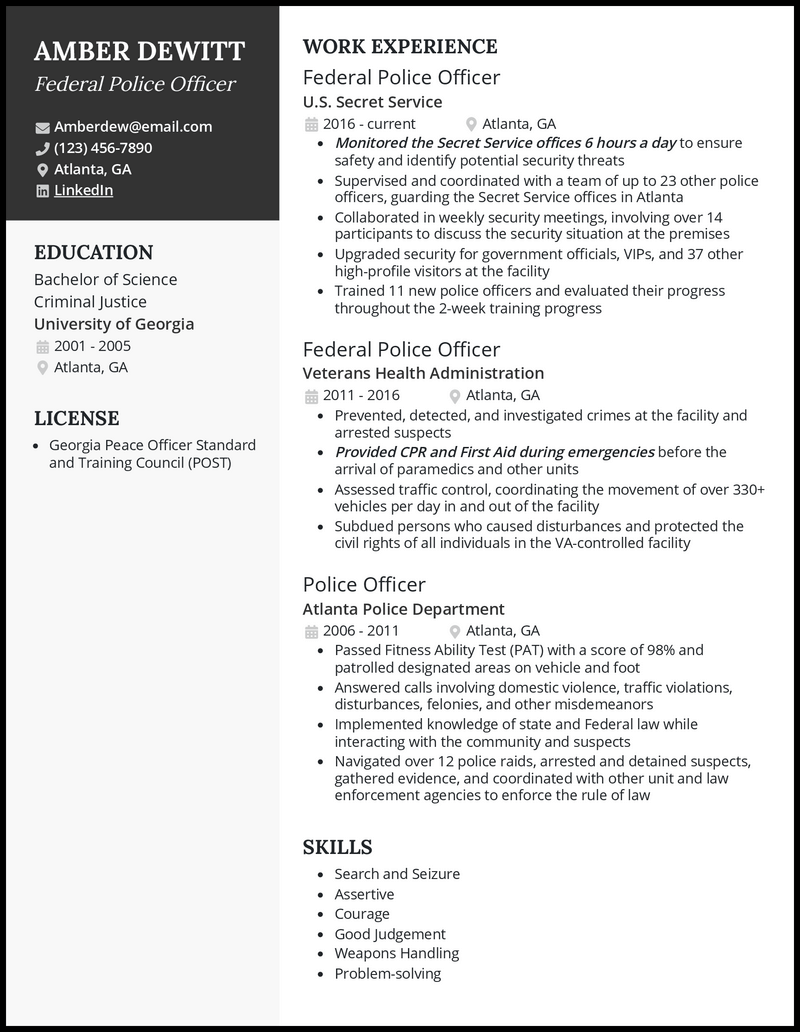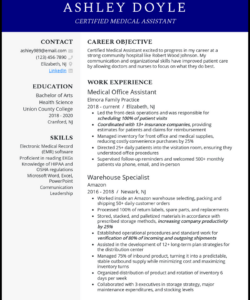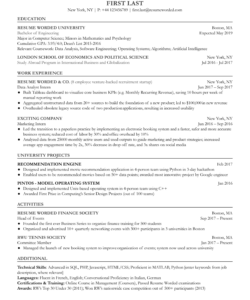Venturing into the highly competitive world of federal law enforcement is an admirable pursuit, offering a chance to serve your country in a significant way. Whether you dream of joining the FBI, DEA, Secret Service, or any other federal agency, your journey begins with a compelling application. And at the heart of that application is your resume, a document that needs to do more than just list your previous jobs; it needs to tell a story of your capabilities, dedication, and fit for such a demanding role.
Many aspiring federal agents often find themselves overwhelmed by the sheer volume of information and the specific requirements for federal applications, which are notably different from private sector resumes. This is where a specialized tool, like a comprehensive federal law enforcement resume template, becomes invaluable. It provides a structured framework, guiding you on how to present your skills and experience in a way that resonates with federal recruiters and passes through automated applicant tracking systems.
Crafting Your Federal Law Enforcement Resume
When you’re aiming for a career in federal law enforcement, your resume isn’t just a summary of your past; it’s a strategic document designed to showcase your readiness for a very specific type of work. Federal agencies are looking for candidates who not only possess a strong foundation of skills and experience but also demonstrate the unique qualities necessary for their missions, such as integrity, critical thinking, adaptability, and an unwavering commitment to public service. Simply listing your job duties won’t cut it; you need to highlight achievements and demonstrate how your experience aligns with their operational needs.

The challenge often lies in translating diverse work histories – whether from military service, local law enforcement, or even unrelated fields – into language that speaks directly to federal hiring managers. This means thinking about every bullet point not as a task you completed, but as a problem you solved or a success you achieved that directly relates to the demands of a federal agent’s role. It involves quantifying your accomplishments whenever possible, using numbers and metrics to illustrate the impact of your work. For instance, instead of saying “managed investigations,” consider “managed 20 criminal investigations leading to 15 successful arrests and convictions.”
Key Sections to Emphasize
While every section of your resume is important, some demand particular attention when targeting federal law enforcement roles. Structuring these sections effectively ensures that critical information is immediately apparent to recruiters who often spend mere seconds scanning a resume. Leveraging a robust federal law enforcement resume template can help you organize this information logically and persuasively.
- Professional Summary or Objective: This is your elevator pitch. Tailor it to the specific agency and role, highlighting your most relevant skills, experience, and career aspirations. It should immediately convey why you are a strong candidate for federal service.
- Work Experience: Go beyond job descriptions. For each role, use strong action verbs and focus on quantifiable achievements. Emphasize skills like investigations, intelligence gathering, evidence collection, report writing, tactical operations, and conflict resolution. If you have military experience, translate your skills and ranks into civilian-understandable terms that highlight leadership and discipline.
- Skills Section: Create a dedicated section for both hard and soft skills. Hard skills might include specific software proficiency, firearms qualifications, language fluency, or defensive tactics. Soft skills, equally important, include communication, teamwork, problem-solving, attention to detail, and adaptability – all crucial for federal agents.
- Education and Training: List your degrees, certifications, and specialized training programs. Include any law enforcement academies, federal training programs (like FLETC), or specific courses related to investigations, forensics, or intelligence.
Remember that federal applications often require a longer, more detailed resume than private sector ones. Don’t be afraid to go beyond one page if your experience warrants it, especially if you have a robust background in law enforcement, military, or investigative fields. The goal is to provide enough detail for recruiters to assess your suitability thoroughly.
Beyond the Template – Making Your Application Stand Out
While a well-structured federal law enforcement resume template provides an excellent foundation, truly standing out requires more than just filling in the blanks. It demands personalization, strategic keyword integration, and a deep understanding of the agency you’re applying to. Every federal agency, from the FBI to the Secret Service, has a unique mission, culture, and set of core competencies they seek in candidates. Your resume should reflect that you’ve done your homework and that your values and skills align with their specific needs.
One common pitfall is submitting a generic resume to multiple agencies. To avoid this, meticulously review each job announcement, identify the key duties, required qualifications, and desired skills, and then tailor your resume to directly address those points. Use the exact keywords and phrases found in the job description to ensure your application passes through automated screening systems. Think of your resume as a marketing document; you’re selling your unique qualifications for that particular federal role.
Furthermore, don’t underestimate the power of storytelling within your bullet points. The STAR method (Situation, Task, Action, Result) can be incredibly effective here. Instead of simply stating you “conducted interviews,” describe the situation that necessitated the interview, the task you had to perform, the specific actions you took, and the positive result achieved. This approach provides context and demonstrates your problem-solving abilities and impact, which are highly valued in federal law enforcement.
Finally, always proofread your resume multiple times, and consider having a trusted friend or mentor review it as well. Errors in grammar or spelling can signal a lack of attention to detail, a critical flaw for any aspiring federal agent. Ensuring clarity, conciseness, and precision in your language will convey professionalism and seriousness about your application. Remember, your resume is often the first and only impression you make before an interview, so make it count.
Embarking on a career in federal law enforcement is a journey that demands dedication, patience, and a meticulously crafted application. By leveraging the power of a specialized federal law enforcement resume template, you equip yourself with a significant advantage, ensuring your qualifications are presented in the most impactful way possible. This foundational tool helps you navigate the intricacies of federal hiring, allowing your unique skills and experiences to shine through the competitive landscape.
With a resume that effectively articulates your value and potential, you are well on your way to making a lasting impression and taking that crucial next step towards serving our nation. Focus on demonstrating your commitment to public service and highlighting how your background prepares you for the challenges and rewards of a federal agent’s life, and you will undoubtedly enhance your prospects for success.


